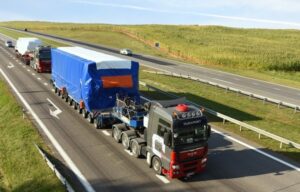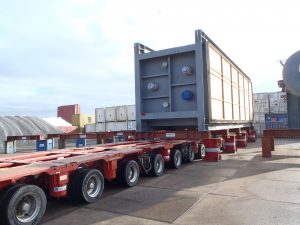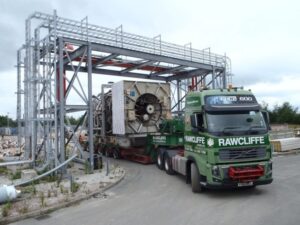
Almost any industry can benefit from heavy haulage transportation. And, in our 45-plus years of working in the transportation industry, we’ve worked with companies in a variety of sectors.
We are leaders in UK heavy haulage and have covered every aspect of transport and haulage – ensuring precision, safety and efficiency at every step.
Whether it’s using escort vehicles or examining every detail of a task, we take accuracy and precision importantly at JB Rawcliffe and Sons.
Continue reading to find out why.
What is heavy haulage?
Heavy haulage is the movement of abnormal and oversized goods and objects that cannot be dismantled and transported using standard means of distribution.
Large, cumbersome goods are transported using specialist equipment and machinery. Regular haulage is simple transportation from one location to another, but heavy haulage involves a lot more planning and strategy to ensure the oversized equipment safely reaches its destination.
Heavy haulage not only requires more, in-depth planning but also specialist equipment and experienced and qualified drivers to safely transport the freight.
Which type of heavy haulage can we transport?
Most industries can take advantage of heavy haulage services – especially from JB Rawcliffe & Sons.
Heavy haulage is ideal for transporting heavy, oversized items that are too big to fit on standard or large vehicles.
The type of cargo we can transport with our specialised vehicles includes:
- Turbines
- Helicopters
- Bungalows
- Generators
- Cooling towers
- Aircraft parts
In our decades of hauling heavy goods, we have safely transported objects from the construction, defence, industrial, marine, and oil and gas industries.
Goods we have transported include the ones listed above and so much more – all thanks to our highly qualified drivers and high-quality specialist lifting equipment and vehicles.

Why is precision important in heavy haulage in the UK?
Precision and accuracy are vitally important to JB Rawcliffe & Sons.
If we put in all the hard work in the build-up to the actual transportation of a company’s goods, it makes our jobs much easier and ensures a safe and efficient delivery.
Failure to check the correct dimensions of the goods can lead to choosing the wrong vehicle for the task. Similarly, if we do not investigate the pick-up and drop-off locations, difficulties may arise during transportation. This could result in choosing a vehicle too large to access both or either location.
And finally, the route must be planned to ensure our vehicles and the goods can safely navigate the roads en route.
What are the four key planning aspects in ensuring precision in heavy haulage?
1. Find out as much information as possible
To efficiently complete a heavy haulage task, we must be as informed as possible. This involves discovering the size and weight of the goods in question, where they’re being picked up from and where they’re being delivered.
Figuring out every possible piece of information about the heavy haulage task at hand is the best possible way of setting ourselves up for a successful delivery.
As a general rule of thumb, we always ask our customers for the same information, which is:
- Collection and delivery locations
- Details of the goods, including dimensions and weight
- Loading requirements (i.e. forklift, tail lift)
- Preferred delivery dates and times
If all customers provide the relevant information to us, we can start effectively planning which vehicle(s) to use, the pick-up location, the route and the destination.
2. Choosing the correct equipment and vehicle
Once all information has been collected, we can discuss the correct vehicle to use.
What do we have to choose from, though?
- Bogies
- HIAB cranes
- Modular equipment
- Platform trailers
- Prime movers
- Semi-low loaders
- Self-propelled modular transporters (SPMT)
We must know the dimensions and weight of the goods because heavier objects may require an escort vehicle.
An abnormal load is classed as weighing more than 44,000kg, a width of more than 2.9 metres and a length of more than 18.65m. If the goods in hand tick these boxes, we will arrange an escort vehicle.

3. Research both pick-up and drop-off locations
The third key aspect to successfully planning a heavy haulage task is to take a detailed look at points A and B.
For instance, where is the pick-up location, and are there any entry or overhead restrictions? This could be as simple as the entrance to the pick-up location being positioned on a narrow street or low-hanging trees nearby.
Also, what is the ground condition like?
Once we gain entry to the pick-up location, do we need any specialised equipment to lift the goods onto our vehicle?
Then, similar questions should be asked about the destination. Precision and efficiency are at the forefront of everything we do – and these questions must be answered before we can accurately pick up and deliver any goods.
4. Plan the route
Now, it’s time to plan the route. Once we’ve figured out any restrictions at the two locations, the size of the goods and chosen the correct vehicle, it’s all about working out the most suitable route.
This includes checking the types of roads we’ll be navigating, avoiding any that are too small, and ensuring a timely and safe delivery.
Fortunately, all of our team are highly qualified and experienced in planning, loading, delivering and unloading heavy equipment.
Reliable and efficient heavy haulage services
At JB Rawcliffe & Sons, we pride ourselves on offering the most efficient and professional heavy haulage services across the entire United Kingdom.
All of our success is based on the hard work we put in before picking up your goods. Precision is key in everything we do, and it shows with each pick-up and delivery we complete.
Without putting in the time at the research and planning stage, we would simply not be able to provide the high-quality service that we pride ourselves on.
Do you have oversized equipment and machinery that requires safe and reliable transportation? Don’t wait any longer. Contact us today by filling in our contact form, calling 01695 737 880, or emailing enquiries@jbrawcliffe.com.
